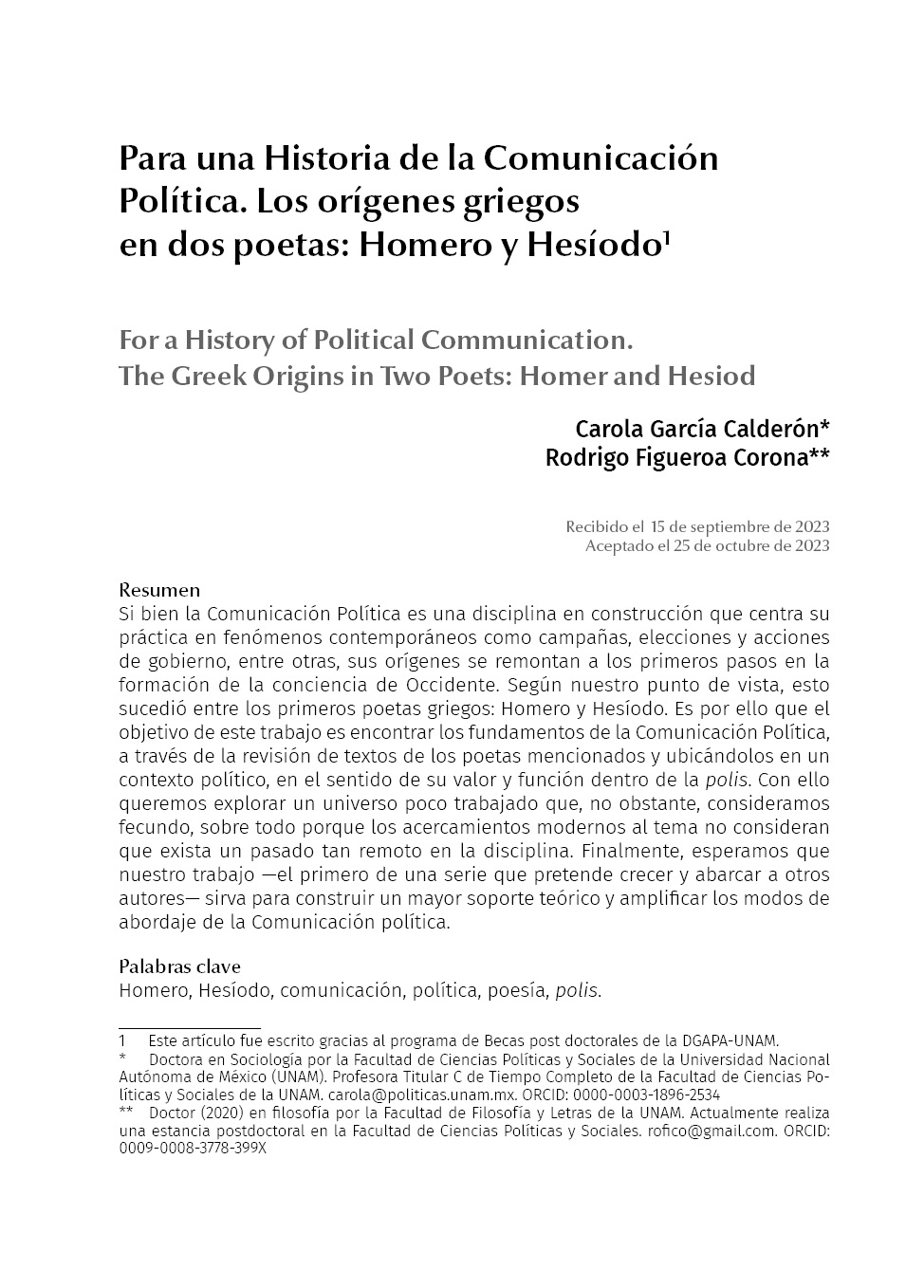For a History of Political Communication. The Greek Origins in Two Poets: Homer and Hesiod
Main Article Content
Abstract
Although Political Communication is a discipline under construction that focuses its practice on contemporary phenomena such as campaigns, elections and government actions, among others, its origins go back to the first steps in the formation of Western consciousness. This happened, according to our point of view, among the first Greek poets: Homer and Hesiod. Therefore, the objective of this work is
to find the foundations of Political Communication, through the review of texts of the mentioned poets and placing them in a political context, in the sense of their value and function within the polis. In doing so, we want to explore a universe that has not been worked much but which we consider fruitful, especially because modern approaches to the subject do not assume that there is such a remote past
in the discipline. Finally, we hope that our work, the first in a series that aims to grow and include other authors, will serve to build a greater theoretical support and amplify the ways of approaching Political Communication.
Article Details
Citas en Dimensions Service
References
Barthes, R. (1970). L´ancienne rhétorique. Aide-mémoire. Communications, (16), 172-223. https://doi.org/10.3406/comm.1970.1236
Breton, P. (2000). La utopía de la comunicación. El mito de la aldea global. Nueva visión.
Bowra, C.M. (1973). Historia de la literatura griega. Fondo de Cultura Económica.
Canel, M. J. (2006). Comunicación política. Una guía para su estudio y práctica. Tecnos.Colli, G. (2005). El nacimiento de la filosofía. Tusquets.
Cordero, N. L. (2009). La Invención de la filosofía. Una introducción a la filosofía antigua. Biblos.
Deutsch, K. (1971). Los nervios del gobierno. Modelos de comunicación y control políticos. Paidós.
Edwards, M. W. (1988). Homer. Poet of the Iliad. Johns Hopkins University Press.
Ferry, J. y Wolton, D. (1998). El nuevo espacio público. Gedisa.
Figueiras, F. L. (2022). Comunicación, Política y Comunicación política. Facultad de Ciencias Políticas y Sociales – UNAM.
Finley, M. (1975). El mundo de Odiseo. Fondo de Cultura Económica.
Forster, R. y Jmelnizky, A. (Comps.). (2012). Dialogando con la filosofía política: de la Antigüedad a la Modernidad. Eudeba.
Gadamer, HG. (1999). El inicio de la filosofía occidental. Paidós.
García Calderón, C. y Martínez Elorriaga, F. (Coords.). (2014). El marco conceptual para la enseñanza de la comunicación política. Facultad de Ciencias Políticas y Sociales – UNAM.
García Gual, C. (2007). Introducción a la mitología griega. Alianza.
Gil, L. (Ed.). (1963). Introducción a Homero. Ediciones Guadarrama.
Hesíodo. (2015). Teogonía, Trabajos y Días - Escudo - Fragmentos - Certamen. Gredos.
Hesiod. (1966). Theogony. Clarendon Press.
Hesiod. (1978). Works and Days. Clarendon Press.
Homero. (2000). Ilíada. Gredos.
Homero. (2000). Odisea. Gredos.
Jaeger, W. (1971). Paideia: los ideales de la cultura griega. Fondo de Cultura Económica.
Laks, A. (2010). Introducción a la filosofía «presocrática». Gredos.
Lesky, A. (1989). Historia de la literatura griega. Gredos.
López Eire, A. (2002). Poéticas y retóricas griegas. Síntesis.
Mazzoleni, G. (2010). La comunicación política. Alianza.
Murray, G. (1944). Historia de la literatura griega clásica. Albatros.
Pernot, L. (2013). La Retórica en Grecia y Roma. Instituto de Investigaciones Filosóficas-UNAM.
Rowe, C. (1979). Introducción a la ética griega. Fondo de Cultura Económica.
Vidal-Naquet, P. (2001). El mundo de Homero. Fondo de Cultura Económica.
Wolton, D. (1999). Sobre la comunicación. Una reflexión sobre sus luces y sus sombras. Acento editorial.

Revista Mexicana de Opinión Pública por Universidad Nacional Autónoma de México se distribuye bajo una Licencia Creative Commons Atribución-NoComercial-SinDerivar 4.0 Internacional.
Basada en una obra en http://revistas.unam.mx/index.php/rmop.




